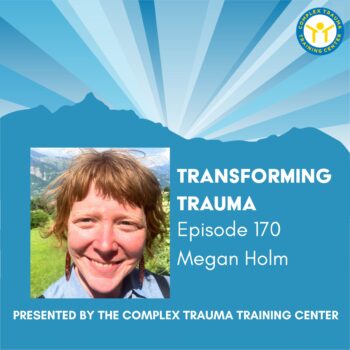Transforming Trauma Episode 170: Integrating Jungian Psychology and NARM with Megan Holm, LMFT
A podcast brought to you by the Complex Trauma Training Center
At the core of Jungian psychology lies the concept of individuation, a lifelong journey of growing into one’s whole self. It’s a process of self-discovery that can feel both inspiring and challenging as each layer of inauthenticity or protective strategy surfaces, then sloughs away. One therapist combines her Jungian background with NARM’s spirit of inquiry to help her clients embrace the nature of individuation and reconnect to their unique selves.
On this episode of Transforming Trauma, host Emily Ruth welcomes Megan Holm, psychotherapist, NARM® Master Therapist, and Somatic Experiencing® Practitioner to discuss the beautiful and unsettling unfolding that can occur when we commit to exploring depth within ourselves. The pair also explores where NARM and Jungian psychology overlap – developing the capacity to hold tension that arises with deeper self-exploration and creating space for noticing rather than judging.
“There’s so much to wonder about,” says Megan, whose professional interests include relational dynamics and trauma. “That’s what ultimately led me to NARM. I wanted to understand some more of that, both for myself and my clients.” Once she completed her original training as a NARM Master Therapist, she continued as a Training Assistant in NARM Trainings, before embarking on an immersive program in Jungian psychology at the International School of Analytical Psychology in Zurich, Switzerland.
“What was really the driver to NARM was partly my own self,” says Megan. “I just thought, Ugh, there’s so much I don’t understand about myself and my own anxieties or repeated patterns, and then just feeling like some of the skills I have or how to go there with my clients, I just felt so helpless about it.” She credits the NARM training with encouraging her to become more self-aware and to assess her hesitance about going to therapy. “The environment I was raised in, people didn’t ask a lot of questions. It was so automatic to not ask and just to assume something.”
As Megan began asking more questions of herself, her interest in depth psychology blossomed, specifically Carl Jung’s work on the collective unconsciousness and the symbolism of myths and fairytales. “Why fairytales? Jung says there’s something scary about what we’re not so conscious of or we’re not aware of in ourselves,” says Megan. “So there’s just the unsettling to interact in the world. But then, what’s in our inner territory that we repress or suppress? This is why symbolism is really important in psychology. It’s the best thing to express something that is unexpressible or that we can’t quite explain, which is what’s symbolic and that’s really alive.”
Megan observes that our symptoms are a doorway for self-exploratory work, inviting us to notice what has gone untended or under-nourished. Jungian psychology’s focus on fantasy, imagination, and dreams offers further guidance, and, while the language differs between it and NARM, Megan says that both provide a roadmap for recognizing and releasing maladaptive strategies so that we can fully live into our true nature. “The first half of life, Jung would say, is really about adapting to the collective, to our environment, to culture, to society, to our families. The second half of life is more about adapting to our own inner self, things that, for many of us, we kind of put aside in order to fit in.”
Transforming Trauma thanks Megan for sharing her insights with our community and encouraging us to embrace self-inquiry as championed by transformative healing approaches like Jungian psychology and NARM.
MENTIONED IN THIS EPISODE
International School Of Analytical Psychology
GUEST BIO
Megan Holm is a Licensed Marriage and Family Therapist (LMFT), NARM® Master Therapist, and Somatic Experiencing® Practitioner in private practice. She has served as a training assistant in NARM Therapist and Master Therapist Trainings. Megan is currently a training candidate at the International School of Analytical Psychology (ISAP) in Zurich, Switzerland. She continues to see clients in the US, working on themes of relationship patterns, belonging, grief and loss, and self-discovery.
Megan is most interested in what Carl Jung calls Individuation: the lifelong process of becoming one’s own unique and whole self. It is a process of self-realization and discovery, seeing ourselves as we are rather than as we wish to be. Our symptoms are a door for this work – they invite us to look inwards, to listen to what has gone untended or under-nourished. Fantasy, imagination, and dreams offer further guidance, helping us to see more clearly who we are and what we uniquely bring to the world. Knowing oneself is an undertaking – a humbling journey that Megan feels honored to take together.

Subscribe for All Episodes
on your Favorite Service:
We want to connect with you!
Facebook @ComplexTraumaTrainingCenter
Twitter @CTTC_Training
YouTube
Instagram @cttc_training
Learn more about The Complex Trauma Training Center: http://www.complextraumatrainingcenter.com